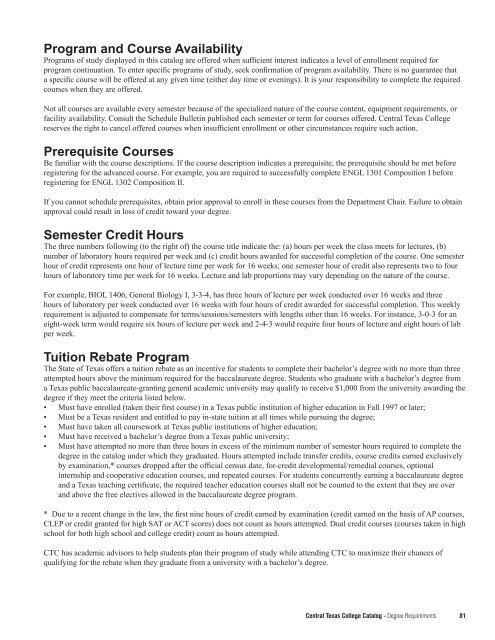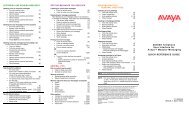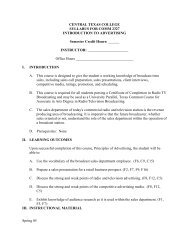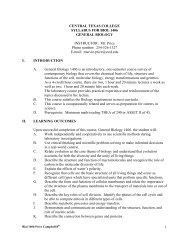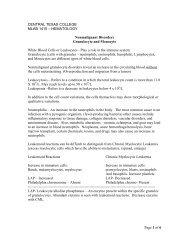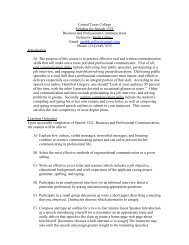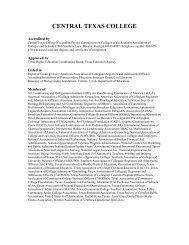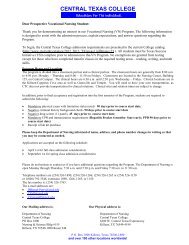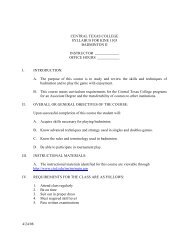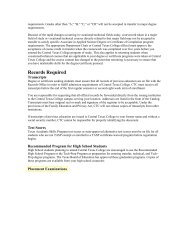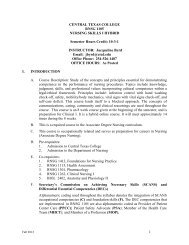Table Of Contents - Central Texas College
Table Of Contents - Central Texas College
Table Of Contents - Central Texas College
You also want an ePaper? Increase the reach of your titles
YUMPU automatically turns print PDFs into web optimized ePapers that Google loves.
Program and Course Availability<br />
Programs of study displayed in this catalog are offered when sufficient interest indicates a level of enrollment required for<br />
program continuation. To enter specific programs of study, seek confirmation of program availability. There is no guarantee that<br />
a specific course will be offered at any given time (either day time or evenings). It is your responsibility to complete the required<br />
courses when they are offered.<br />
Not all courses are available every semester because of the specialized nature of the course content, equipment requirements, or<br />
facility availability. Consult the Schedule Bulletin published each semester or term for courses offered. <strong>Central</strong> <strong>Texas</strong> <strong>College</strong><br />
reserves the right to cancel offered courses when insufficient enrollment or other circumstances require such action.<br />
Prerequisite Courses<br />
Be familiar with the course descriptions. If the course description indicates a prerequisite, the prerequisite should be met before<br />
registering for the advanced course. For example, you are required to successfully complete ENGL 1301 Composition I before<br />
registering for ENGL 1302 Composition II.<br />
If you cannot schedule prerequisites, obtain prior approval to enroll in these courses from the Department Chair. Failure to obtain<br />
approval could result in loss of credit toward your degree.<br />
Semester Credit Hours<br />
The three numbers following (to the right of) the course title indicate the: (a) hours per week the class meets for lectures, (b)<br />
number of laboratory hours required per week and (c) credit hours awarded for successful completion of the course. One semester<br />
hour of credit represents one hour of lecture time per week for 16 weeks; one semester hour of credit also represents two to four<br />
hours of laboratory time per week for 16 weeks. Lecture and lab proportions may vary depending on the nature of the course.<br />
For example, BIOL 1406, General Biology I, 3-3-4, has three hours of lecture per week conducted over 16 weeks and three<br />
hours of laboratory per week conducted over 16 weeks with four hours of credit awarded for successful completion. This weekly<br />
requirement is adjusted to compensate for terms/sessions/semesters with lengths other than 16 weeks. For instance, 3-0-3 for an<br />
eight-week term would require six hours of lecture per week and 2-4-3 would require four hours of lecture and eight hours of lab<br />
per week.<br />
Tuition Rebate Program<br />
The State of <strong>Texas</strong> offers a tuition rebate as an incentive for students to complete their bachelor’s degree with no more than three<br />
attempted hours above the minimum required for the baccalaureate degree. Students who graduate with a bachelor’s degree from<br />
a <strong>Texas</strong> public baccalaureate-granting general academic university may qualify to receive $1,000 from the university awarding the<br />
degree if they meet the criteria listed below.<br />
• Must have enrolled (taken their first course) in a <strong>Texas</strong> public institution of higher education in Fall 1997 or later;<br />
• Must be a <strong>Texas</strong> resident and entitled to pay in-state tuition at all times while pursuing the degree;<br />
• Must have taken all coursework at <strong>Texas</strong> public institutions of higher education;<br />
• Must have received a bachelor’s degree from a <strong>Texas</strong> public university;<br />
• Must have attempted no more than three hours in excess of the minimum number of semester hours required to complete the<br />
degree in the catalog under which they graduated. Hours attempted include transfer credits, course credits earned exclusively<br />
by examination,* courses dropped after the official census date, for-credit developmental/remedial courses, optional<br />
internship and cooperative education courses, and repeated courses. For students concurrently earning a baccalaureate degree<br />
and a <strong>Texas</strong> teaching certificate, the required teacher education courses shall not be counted to the extent that they are over<br />
and above the free electives allowed in the baccalaureate degree program.<br />
* Due to a recent change in the law, the first nine hours of credit earned by examination (credit earned on the basis of AP courses,<br />
CLEP or credit granted for high SAT or ACT scores) does not count as hours attempted. Dual credit courses (courses taken in high<br />
school for both high school and college credit) count as hours attempted.<br />
CTC has academic advisors to help students plan their program of study while attending CTC to maximize their chances of<br />
qualifying for the rebate when they graduate from a university with a bachelor’s degree.<br />
<strong>Central</strong> <strong>Texas</strong> <strong>College</strong> Catalog - Degree Requirements


